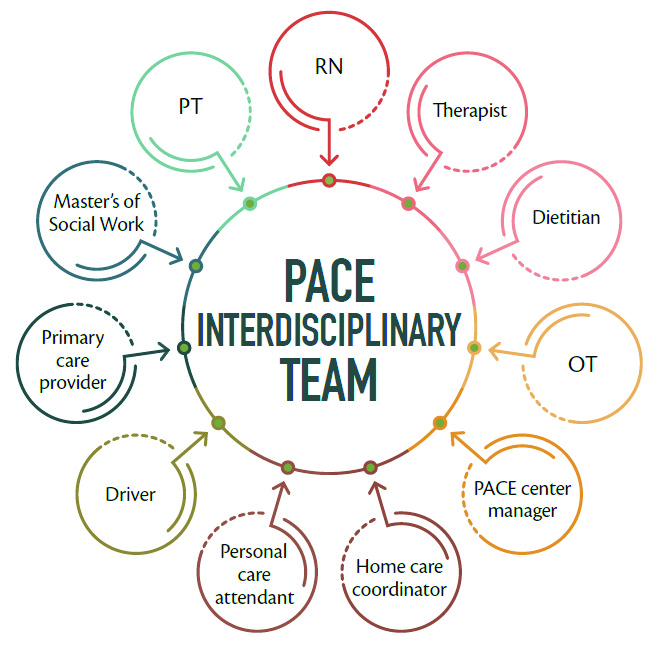
By Brittany Kearney, MBA, MA, CDP
Have you or your loved one struggled to find transportation to your doctor appointment or access to the right medication to meet your medical needs? Does this leave you feeling you have no one else to turn to other than 911 or the dreaded visit to the Emergency Room? Individuals with multiple chronic conditions place a formidable burden on the healthcare system because of the multiple hospitalizations they often feel they require, but many times are unnecessary and avoidable. The Program of All-Inclusive Care for the Elderly (PACE) is a model of care that grew out of a need to effectively and efficiently treat patients with multiple chronic conditions outside of the hospital setting. The PACE Model incorporates an Interdisciplinary Team approach to care for older adults with these chronic conditions, helping them remain in their home.
The PACE Interdisciplinary Team (also referred to as the IDT) is comprised of a team of providers, homecare coordinators, transportation drivers, nurses, social workers, physical and occupational therapists, dietitians, recreational therapists, and others, who evaluate PACE participants and develop an individualized plan of care. This IDT, as it is known, is similar to other team-based programs in healthcare, but is unique in that it includes both professionals and paraprofessionals who take a comprehensive approach to care management.
The IDT ensures that services are provided throughout the full continuum of care: preventive, primary, acute, rehabilitative, long-term, palliative and end of life. The IDT will make all of your necessary appointments, coordinate specialists, fill your prescriptions, and provide your transportation. Your care team will partner with you and your loved one to coordinate and provide all services medical necessary for your improved health and well-being.
The IDT’s unique ability to influence health outcomes by working together towards a common goal, is what makes the PACE model of care so successful. They have greater depth, creativity, proactivity, and flexibility in their problem solving, resulting in better interactions and cohesiveness within the IDT, and influence in the overall care management of participants. This leads to better care plans, coordination of services, compassionate and comprehensive care, and ultimately better outcomes for participants and their families.
At PACE, the individualized care plans are developed by the IDT, the participant, and their caregivers, with an emphasis on independence in the home and building on the participant’s strengths and needs. Because participants are a part of their care planning process, they are encouraged to adhere to this plan of care as a way to maintain an optimal level of health and functioning. Goals and interventions are assigned to their respective disciplines for follow-up, and are assessed for any needed changes every 6 months, or after a major change or event has occurred. The IDT’s ability to integrate and carry out all disciplines as laid out in the plan of care, is a critical factor in reducing the risk of hospital admissions and improving outcomes.
What motivates PACE’s IDT to provide such a comprehensive approach to your care? Their goal is simple – to help you or your loved one live independently in your home with those you love for as long as possible.
Should you or your loved one be interested in learning more about PACE in your area please contact one of the following locations:
- PACE of the Southern Piedmont (Serving Mecklenburg, Cabarrus, Union and Stanly Counties), 704-887-3853, www.pacesp.com.
- Senior TLC (Serving Gaston, Lincoln, and Cleveland Counties), 704-874-0600, www.seniortlc.org
For more additional on PACE in North Carolina or to read more about the overall PACE Model of Care please visit ncpace.org or npaonline.org.



